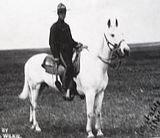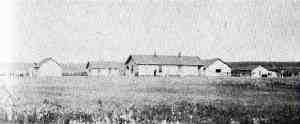
| Home | Lineage and Birth | The early years. | Conrad the Mountee. | 23rd of August 1914 | Captivity Espionage and Escapes | Augustabad | Barry Bingham VC | Conrad meets M | Conrad Assistant Military Atache. | The ffrench Connection | The Last Tigerhunt. | The Archaeology of the Reich | From Intrigue and artifice to Art. | The names Ffrench, Conrad Ffrench. | Ian Fleming | The Black Ore of Death | An Evil Medium | Off the Chessboard. | Arbutus Point. | Conrad retires to the field | The Art of Conrad O'Brien-ffrench | The Quotient of Conjecture. | News and Gossip | Bookshop & Bibliography | Mailbag | Related Links | Contact Me | ||||||||||||||||
|
Conrad Fulke O'Brien-ffrench. Artist and Spy. |
||||||||||||||||
|
A Mountee always gets his man. |
||||||||||||||||
|
|
||||||||||||||||
|
Conrad had
begun his first adventure. He felt ". . . fear of letting go of that to
which I was previously attached. Moreover, my life in His
travels in the West began with a transcontinental journey on the Canadian
Pacific Railway. The vastness of the new land, he said, filled him with
loneliness. At He
traveled to
After
his
basic training was completed, Conrad was posted to Cypress Hills – ‘so named by
the French fur traders of the 1800's who mistook the local Lodge pole pine for
Jack pine (
When
Conrad was posted to Willow Creek, the harsh character of the land he had
chosen as his home became known to him just a month after his arrival. One day
on patrol, he set out from a ranch he had stayed at overnight. He noticed it
was a dark day, with a rising wind and falling temperature, but continued on
his way regardless. He found himself overtaken by a blizzard and was soon enveloped
in a blinding whiteness. Sometimes he could only see as far as his horses ears.
"Fear
I had felt for a bunch on trigger happy drunks was nothing compared to this. It
was as if one was in a white hell . . . One was being consumed by white tongues
of ice . . . I felt too numb to think for the cold seemed to freeze my brain .
. . Dropping my reins I left it to my horse." (DM p 31) After
hours floundering about in the drifts, Conrad blundered into a barbwire fence.
Eventually he found a gate, and soon a ranch. He notes later how often Mounties
owed their lives to the good sense of their mounts. Fate
intervened. Conrad received news from home that his mother was seriously ill.
He applied for his release and returned home. But he had fallen in love with
the wild woods of The Great
War was coming and Conrad joined a special reserve battalion of the Royal Irish
Regiment, the Tipperary Militia. Having seen his little sister Yvonne cared for,
he reported to barracks. "A wilder
month I have never spent!" He enrolled in a military school to prepare him
for exams – exams he was never to take. War came instead. Conrad and his
regiment were immediately despatched to "as a company
of the 2nd Battalion
Connaught Rangers passed us singing, with a note of strange pathos in their
rich Irish voices, a song I had never heard before" The song? – “It's a
long way to
|
||||||||||||||||
|
|
||||||||||||||||
|
Enter supporting content here
|
||||||||||||||||





